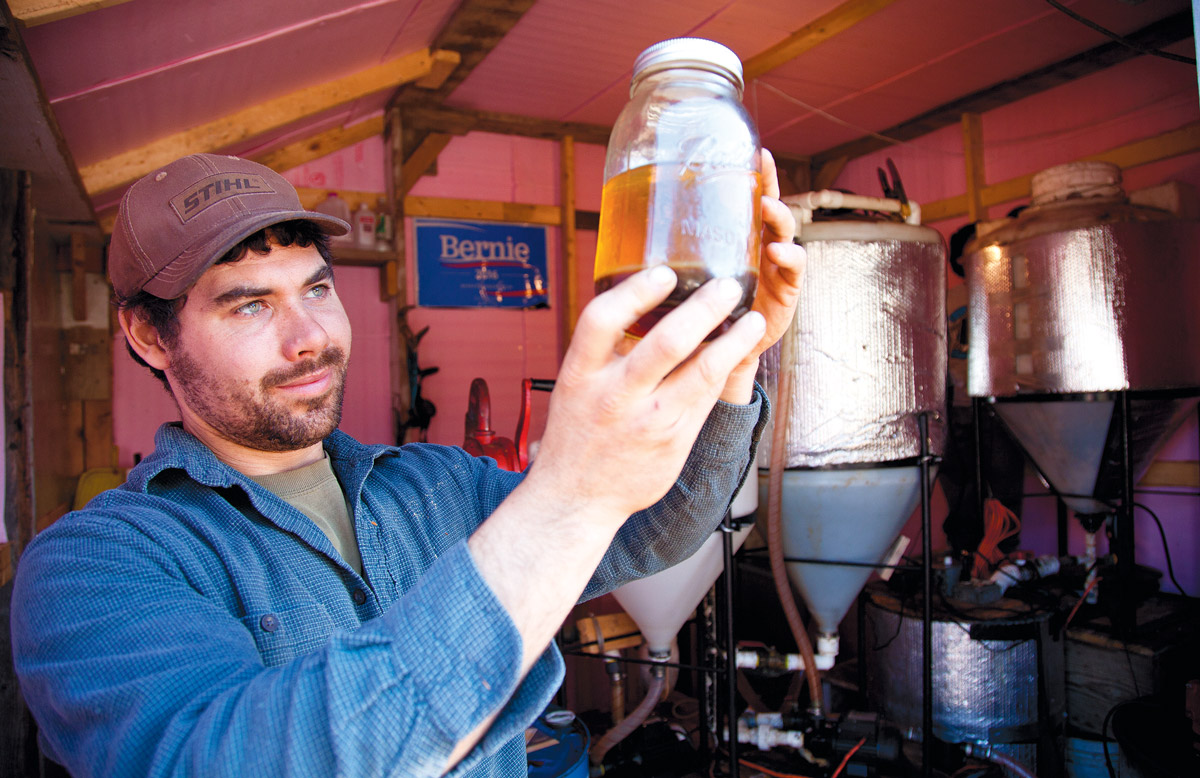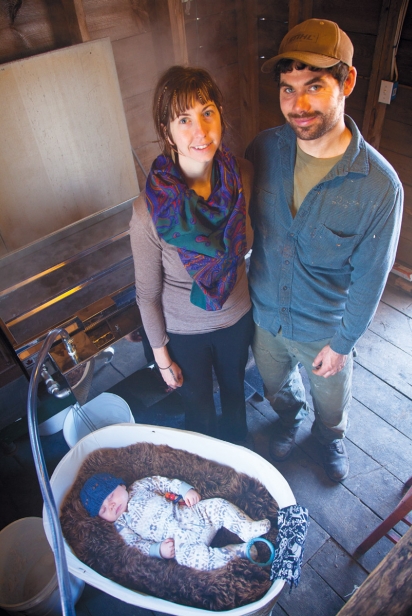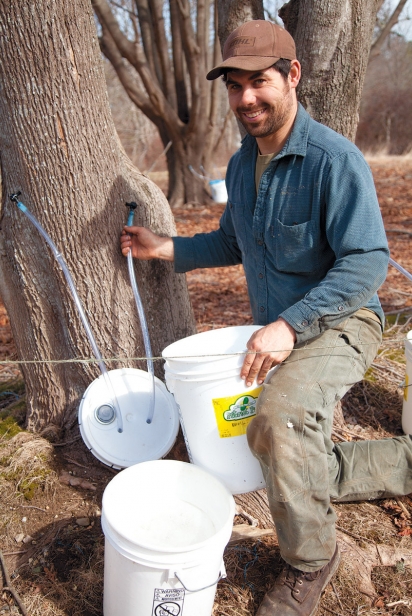Diamonds in the Rough
The Next Generation Keeps Falmouth’s Agricultural Tradition Alive at Pariah Dog Farm
Pariah Dog might seem an unusual name for a farm on Cape Cod. But for Matt Churchill and Jeny Christian, these Indian street dogs—which survive off waste from human settlements—symbolize a vital ecological niche that inspires their farming philosophy.
“We view ourselves as pragmatic scavengers. Our goal is to source as much as feasibly possible from locally produced waste streams and convert it into wholesome food for local consumption,” says Christian.
A closer look at this tidy eight-acre farm in East Falmouth reveals evidence of the “scavenger” approach. Piles of wood chips from local tree companies dot the landscape, to be spread on fields, parking areas and pathways. The fertile moraine soil is supplemented with compost and manure from local sources. Flocks of chickens peck at bright orange pumpkins left over from last fall’s crop. Jugs of brown waste veggie oil are lined up in the barn, waiting to be transformed into biodiesel that heats the greenhouses and powers trucks and machinery.
The result of this ingenuity and thrift is a year-round abundance of vegetables, eggs and herbs, available through the Pariah Dog Farm CSA, a weekly farm stand and presence at the Falmouth Farmers’ Market, Mahoney’s Winter Market and Windfall Market. From greens and radishes in the spring, beans and tomatoes in the summer, pumpkins and beets in the fall, and kale and carrots in the winter, Pariah Dog extends its productivity with three large greenhouses, a large storage cooler, and a bevy of dedicated volunteers.
Located in what was once Falmouth’s main agricultural zone, Pariah Dog Farm is now an anomaly in a flattened residential landscape tucked between municipal ballfields and the commercial zone of Route 28. But what’s even more rare about Pariah Dog Farm is that its owners are in their early thirties. According to a 2011 study by the Association to Preserve Cape Cod, most farmers in the region are between the ages of 46 and 74, with limited prospects for passing on the family farm to the next generation. The price of land, excessive regulations and a low return on investment were cited as the top barriers to entry for new farmers, and the reason why thousands of acres of farmland have been lost to development over the last 50 years.
“The farm doesn’t pay for itself, but to me, farming is a calling,” says Churchill, who makes ends meet year-round with his landscaping business and working in the kitchen at Wicked Pizza in Mashpee during the winter months.
Like some Cape Codders who remain in their hometowns past high school, by choice or by circumstance, Churchill found himself in a destructive cycle of substance abuse and dead-end restaurant jobs. But at age 22, he started to turn his life around, enrolling in the horticulture program at Cape Cod Community College. He found success as a landscaper: within four years, Churchill had saved enough for a down payment on a run-down former turkey farm on Trotting Park Road in East Falmouth.
He moved to the property in the summer of 2012 and got to work clearing out the junkyard remains, tilling the soil, and convincing friends to help him move a greenhouse he purchased from a neighbor from down the street—all by hand.
Though Churchill had no prior farming experience, he considered all hard work an existential reward for the “emptiness” of conventional landscaping. He didn’t set out to be an organic farmer, but after spending some time at the Falmouth Farmers’ Market, he realized that his potential customers wouldn’t settle for anything less. And as he learned more about soil ecology and food security, he also realized that organic practices were more in line with his philosophies. (The Pariah Dog farmers say that the fees to become certified organic are prohibitive, but claim they are “customer-certified” in their organic methods.)
In his first summer as a farmer, Churchill started with a plot of garlic. “I did it all wrong,” he remembers. “The soil was too compacted and I made it worse with my plowing.”
By the next year, with borrowed equipment and lots of advice from farmer Geoff Andrews, of Tony Andrews Farm, and Cape Cod Cooperative Extension educator Russ Norton, Pariah Dog Farm started selling produce to Windfall Market in Falmouth and joining the ranks at the farmers’ market.
Four years later Churchill is taking a break from cutting and stacking wood with Christian and their newborn son, Jack. Snow is beginning to drift outside and the wood stove is cranking. After meeting at a Northeast Organic Farmer’s Alliance conference in 2013, the pair immediately found a connection in their passion for small-scale intensive organic farming. Christian moved to Falmouth from Western Massachusetts the following year, and quickly became the face of Pariah Dog Farm at local farmers’ markets.
For Christian, farming is a continuation of her community service, which she sees as extending from restaurant work as a teenager to serving as a diesel mechanic in Iraq and Kuwait with the Massachusetts National Guard.
“Anything that provides the necessities of life is service—whether it’s food, energy or housing. I see farming as a way to serve and connect with my community,” says Christian, who holds an associates degree in Food and Farm Systems from Greenfield Community College and certificates in permaculture design, renewable energy and energy efficiency.
Christian’s knowledge of soil ecology has led to a more permaculture approach on Pariah Dog Farm. Rather than plow or rototill the fields after each harvest, the farmers plan to create permanent beds over the next couple years. Following in the footsteps of permaculture pioneer Jean-Martin Fortier, Christian says this shift to “shallow tillage” will reduce soil compaction and the spread of weeds, while increasing water absorption and allowing worms and microbes to enrich the soil.
Over the winter, Churchill and Christian launched a GoFundMe campaign to purchase a two-wheeled tractor that’s capable of tilling just the soil surface, as well as mowing and removing snow. If they’re able to raise the money in time for the growing season, they plan to get rid of their gasoline-powered tools and use their large diesel tractor only for clearing land. Pushed by hand and powered with a biodiesel motor, the tractor is a milestone in their quest for sustainability—environmental and financial.
“This machine and implements will help us reduce our reliance on fossil fuels as well as saving us labor in the field and garage,” says Christian. “Working more efficiently will save us time so we can devote more time to the needs of our land and community in an effort to make both healthier and more resilient.”
Though mere mortals would think their plates were full with two businesses and a newborn, Churchill and Christian are looking ahead to future expansion. Their goal is to become a biodynamic “full diet farm” by growing fruit and nut trees and their own chicken feed, and even adding sheep to their stable of rabbits and chickens.
The opportunity to raise sheep for wool, milk and off-site slaughter might come sooner than later. The pair plan to submit an application to replace the steward at Peterson Farm, an 88-acre tract administered by the Town of Falmouth that has served as a sheep pasture since 1998.
In the meantime, Christian and Churchill do what they can to supply sweet and salty tastes from their farm. With retired biologist Chris Weidman, they set up a system to concentrate solar rays that evaporate seawater into salt. Available at the farm stand and farmers’ markets, the grayish granules are bottled according to hyper-local standards, satisfying discerning palates from Waquoit Bay to Gansett Point. And while their beehives have yet to survive a winter, Pariah Dog Farm has produced its own maple syrup since 2013.
During the blustery days of January, Churchill and Christian tapped dozens of maples scattered around Falmouth. As temperatures fluctuated between freezing during the day and below freezing at night, the sap began to flow. Once they collected 300 gallons, they fired up the wood-burning evaporator in their sugar shack, stoking it all day with Jack sleeping peacefully nearby. With 120 taps dripping over 1000 gallons of sap this winter, the pair estimate they’ll have 10 to 20 gallons of syrup to sell by spring.
Making maple syrup is a snap compared to the more complex process of transforming cooking oil into biodiesel—and the byproduct glycerin, which can be used to make soap, says Churchill, who uses the biodiesel to run his trucks and tractor.
In addition to supplying food to the community, Christian and Churchill are actively trying to preserve and promote local farming. They’ve held a number of “Falmouth Foodshed” meetings to discuss the historical roots of farming in the area. And they currently serve on a Falmouth Agricultural Commission working group to explore options for the town to purchase Tony Andrews Farm, a 20-acre strawberry, corn, pea and pumpkin farm in East Falmouth that was put on the market over the winter.
“Tony Andrews is the only farm left in town that operates on a large scale. Without people like Geoff Andrews, we’ll lose all that knowledge,” says Churchill, reflecting on how the older farmer’s advice, itself handed down from the generation that emigrated from Portugal, helped him get Pariah Dog started.
To learn more and donate to the Pariah Dog Farm tractor crowdfunding campaign, visit www.gofundme.com/pariah-dog-farms-sustainability.






